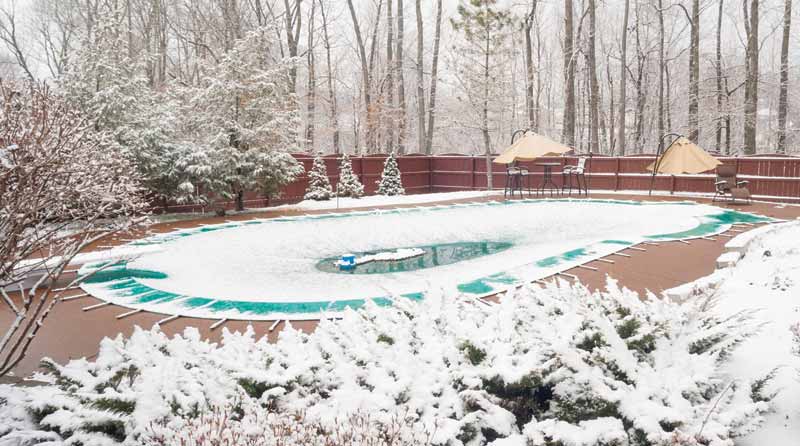

on order over $199
Vaughan Pool Supplies > Uncategorized > Buying a home with a pool?
Buying a home with a pool?
Buying a home with a pool?
Here’s what you need to know.
Article By: Mark Leaman, President | York Pool Services Inc.
The home inspection
Many home inspectors have the skills and the knowledge to evaluate the status of a swimming pool. But real estate agents and homebuyers alike should be aware of their limitations:
No home inspector is qualified to report on a pool that’s not open and operational.
While a pump can certainly be turned on and off in the winter to check if the motor works, there’s no way to run a pool heater or saltwater chlorinator without water flowing through the system to activate the flow/pressure switch. That means that when it comes to buying a pool home in the winter, buyer beware.

Even if a pool is open, a home inspector can only comment on what he or she sees.
A beautiful new liner may be covering up cracks in the concrete floor under the pool. Or, the liner may appear intact but there are tiny leaks in gasketed areas like the skimmer, returns, main drain, pool light or stairs. In fact, a minute leak can lower a pool’s waterline by as much as an inch a day. This is the type of thing that home inspectors will avoid commenting on simply because it’s beyond the scope of their inspection. Instead, they will make more general comments like:
- "Pump operational"
- "Heater operational but requires annual maintenance"
- "Liner appears to be intact and less than 5 years old"
- "Water clarity good"
- "Pool deck has hairline cracks in concrete, moderate shifting"


The good news is that you can get a more in-depth inspection. But given the lightning-fast pace of the Toronto real estate market, you’ll need to act quickly. Here’s what you can do:
1. Hire a pool company to do a secondary inspection.
In the last couple of years, pool equipment has advanced and become computer-based. So while the average home inspector may be able to evaluate a conventional heater, he or she may not know anything about saltwater computers, ozonators, automatic pool controls, etc. But a pool professional will. Pool professionals regularly attend seminars to learn about the latest innovations, equipment and products, so they have a definite competitive advantage over an inspector.

2. Hire a leak detection company.
Leak detection companies use highly sensitive sonar equipment and other complex machinery to determine if there is a leak in any plumbing. These companies are very familiar with pools and often even have specialized pool departments. Companies like Canada Leak Detection offer this service, but it can take weeks to months to get an appointment. Fortunately, I partner with several leak detection specialists regularly, and can recommend one that best suits your needs, timeframe and budget.
3. Perform the Bucket Test.
To check for a leak in any pool, do this simple test.
A. Place a bucket onto the steps of the pool, ensuring that the top of the bucket is not underwater.
B. Add enough water to the bucket so that it does not float. If necessary, add a brick to the bottom of the bucket to help keep it in position.
C. Mark the waterline with duct tape on the outside of the bucket.
D. Mark the waterline with duct tape on the inside of the bucket.
The pool’s waterline outside the bucket should not be in direct contact with the water inside the bucket, but the bucket must be submerged enough that the water temperature outside the bucket influences the water temperature inside it.
E. Leave the bucket for a few days. When you return, you may notice the following scenarios:
i. The outer waterline has lowered in comparison to the outer duct tape more than the bucket’s inner waterline. THIS INDICATES A LEAK SOMEWHERE.
ii. The inner and outer waterlines have lowered almost exactly by the same amount. THIS INDICATES THAT THERE IS LIKELY NO LEAK AND THAT THE WATER HAS SIMPLY EVAPORATED.
iii. Both waterlines have not moved. THIS MEANS THERE ARE NO LEAKS.

If you have any questions about buying a home with a pool or would like to consult with us to weigh the risks, costs and blind spots, please get in touch with us. We’re here to help you make an educated decision.


